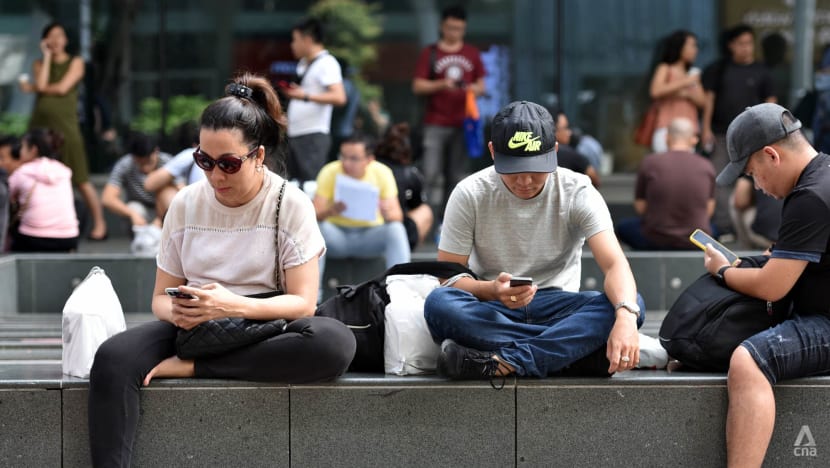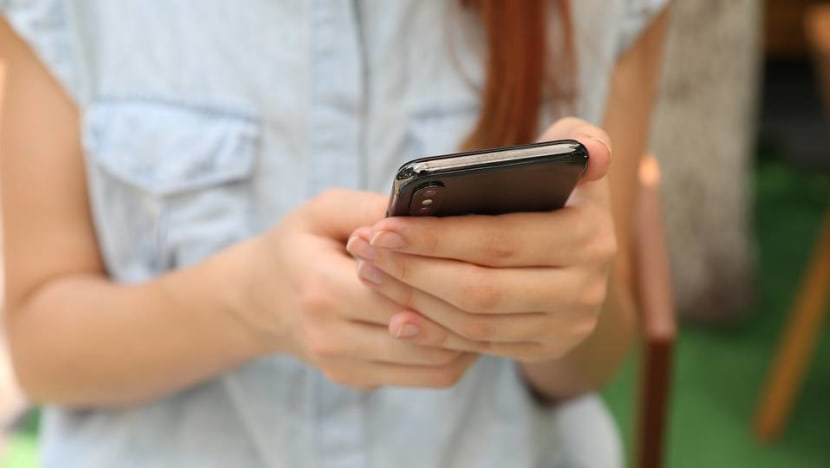Commentary: A digital detox won’t reset your busy life
With work and family commitments, disconnecting our phones completely can be difficult, if not impossible, say Yale-NUS researchers.

File photo of a man using his mobile phone. (Photo: CNA/Calvin Oh)
SINGAPORE: Can you go a day without your digital devices?
Worldwide, Mar 4 has been declared the “National Day Of Unplugging”, a campaign launched in 2009 to raise awareness of the impact that smartphones have on mental health.
On this day, participants are urged to store their phones for 24 hours, spending the time unwinding and catching up with friends in person.
To date, over 100,000 people have registered on the event website. Although the campaign started in the US, Unplug initiatives have reached the UK and Australia.
As the Unplugging movement spreads across the world, it is timely to ask whether Singapore is due for its own 24-hour Day of Unplugging.
With our fast-paced and always-on culture, people here have no doubt heard of the benefits of a digital detox. Some might even practise unplugging outside work hours or have attended retreats at hotels or resorts where device use is restricted.
DO WE REALLY NEED A DAY OF UNPLUGGING?
Although we conduct research on digital well-being and applaud global efforts, we will not be organising initiatives on unplugging anytime soon.
Unplugging is impossibly difficult. Last year, as part of our research studies, our team conducted a pilot programme where we put our phones away for a week.
Even though we found ourselves having more time, nearly every team member complained about being “bored” and “inconvenienced”.

Not surprisingly, everyone returned to their usual phone habits once the pilot ended. What then would depriving someone of their phone achieve in the long run?
Some research even suggests that unplugging provides little benefits. A Loughborough University-led study in 2019 found that a 24-hour abstinence from smartphone usage did not change participants’ moods or anxiety, but only made them crave their phones more.
In a smart nation like Singapore, it also seems contradictory to place bans on our digital devices. After all, we aspire to be a “Silicon Valley” in the region and send our young children for coding and computer classes. Shouldn’t we instead encourage screen time?
DANGERS OF UNHINDERED SCREEN TIME
While we don’t believe in complete phone bans, a case can be made for putting brakes on our digital devices.
Over the past two decades, researchers have found that using digital screens in an unbridled manner can interfere with our life goals.
In extreme cases, some people use their phones so excessively that they become addicted. Globally, an estimated 1 in 4 youths show signs of phone addiction, placing them at risk of poorer mental health and poorer sleep patterns.
Even if we aren’t addicted, we often use our phones because they promise to support our social and productivity goals – only to discover that phone usage gets in the way. Correspondingly, a Pew Research survey found that across 11 countries, nearly every respondent expressed some concerns about the negative effects of phone usage.
Most of us can also recount incidents where our devices ended up causing problems.
We all know someone who, during a meal, keeps glancing at notifications on their phones or smartwatches. We quite likely feel annoyed at being ignored or having conversations sidetracked – if we aren’t guilty of it ourselves.
In this scenario, connecting online compromises offline relationships.
Mental health and youth: Is something broken in Singapore society? Listen to CNA's Heart of the Matter:
Or imagine a time when you worked on a project. Midway, you decided to check your email inbox. Instead of making headway on your project, you ended up reading a never-ending series of non-urgent emails.
Once again, unrestrained digital access turned out to be counter-productive.
THE CASE FOR DIGITAL MINIMALISM
Can we limit the negative consequences of screen time? Disconnecting our phones completely is unlikely to work, as office commitments and family responsibilities often require us to stay connected.
As an alternative, computer science Professor Cal Newport argues for digital minimalism – choosing to be selective about our digital activities to minimise disruptions in our lives.
As the first step, Newport suggests that we rid ourselves of as many digital activities as possible. This approach is counter-intuitive for those of us who fear missing out.
By contrast, Newport argues we should only retain the activities that support our life goals. For example, instead of subscribing to five social media platforms, we could choose only the platform that best connects us to our friends or our interests.
Based on our shortlist, we should then select the best format to support our goals. For example, we may choose to receive social media updates through a web browser rather than an app. This would prevent the app’s pop-up notifications from distracting us during the day.
By applying these two steps, Newport contends that we would declutter our digital lives and use our devices in a more intentional way. In the words of Marie Kondo, we should only be left with digital activities that “spark joy”.
PURSUING SUSTAINABLE AND PRACTICAL SOLUTIONS
Psychology research offers further tips for adopting digital minimalism. First, as a general principle, we shouldn’t depend on self-control to will ourselves into intentional phone usage. Phones apps were designed to capture our attention, and they succeed in getting us hooked.
As an alternative, we will find greater success by limiting access to digital devices.

For example, if you are having lunch with a friend, make the commitment to be fully present. Put your phone far away from you throughout the meal, in a place where you can’t be disturbed.
If you’re trying to work, consider working in a cafe without Wi-Fi access to distract you. Alternatively, if your work requires internet access, you can install software that sets temporary restrictions on recreational apps like Facebook or YouTube.
Before you start decluttering, you should also plan activities that can keep your hands busy. Consider learning a new instrument, reading, or gardening.
In sum, being ready with a plan will help you stay on track. Instead of aiming for complete disconnection, consider small changes that you can easily incorporate into your life for the long run.
In a world of increasing chaos, digital minimalism can help us become more mindful of our devices. By decluttering, we prioritise meaningful connections with others and reconnect with hobbies we stopped engaging in.
Although most of us do not have the appetite for a 24-hour Day of Unplugging, all of us can benefit from digital minimalism as a means to live more productive and meaningful lives.
Jean Liu is Assistant Professor of Social Sciences (Psychology) at Yale-NUS College. Her research group examines the impact of technology, exploring ways to thrive in a digital world. Nicole Nazareth is a final year Psychology student at Yale-NUS College who takes a keen interest in child and adolescent development amidst the changing technological landscape.


















